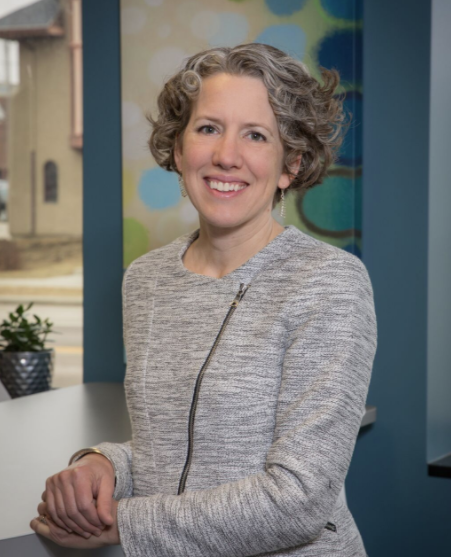

Founder and Executive Director
Kids First Law Center
Jenny Schulz knows the stereotypes about lawyers and she’s having none of it. When families going through divorce place their kids in the middle of an emotional warzone, she and her team of counselors can put an end to years of conflict.
Established in 2005, the Kids First Law Center is the only organization in the state that shields kids from the toxic repercussions created by high-conflict divorces. After doing this type of work in Washington, D.C., Ms. Schulz saw an unfulfilled need when she moved back to Iowa. Only a few families can afford a third lawyer to represent the children, even though they are the most vulnerable.
“We only represent kids in families with chronic conflict. These are children who have been neglected or abused, exposed to verbal and physical fights, or witnessed substance abuse,” Ms. Schulz explained. “They are locked in custody battles where they are being forced to pick a side. Research shows that this type of environment can physically slow development and increase the risk of emotional and behavioral issues that lead to drug, alcohol and school issues.”
With a staff of 12, the center serves between 800-1,000 children every year. Ms. Schulz and her staff use an intensive approach to create true change. For children, it starts with strengthening their relationship with individual parents.
“We help children reestablish a healthy connection with their parents. We ask them what a parent could do to show their love, which might look like one-on-one time or attending a school activity,” Ms. Schulz said. “Sometimes the communication is so fractured though, that a child’s concerns have to be vocalized first with the help of a counselor.”
Children also attend workshops to learn about conflict resolution strategies, skills that often aren’t being modeled or taught by their parents. Kids are given a safe space to explore their feelings and develop coping mechanisms.
“Whether it is taking a client to Dairy Queen or asking the child to draw a picture depicting her feelings of the tug-of-war between Mom and Dad, Jenny has a uniquely effective way of communicating with and empowering her clients so their voices are heard,” wrote Thomas Wolle, an attorney with Simmons Perrine Moyer Bergman, in his nomination.
The center also helps parents establish co-parenting strategies that provide uniformity in their children’s lives. Counselors can facilitate parenting plans – a written summary that documents how the adults are in agreement about everything from discipline tactics to holiday schedules.
“What makes Jenny’s passion and determination to help these children even more remarkable is that she is not a child of divorce. Her mission to represent and support these children is out of pure devotion to the underserved and search for justice for all,” wrote Tiffany O’Donnell, CEO of Iowa Women Lead Change.
Ms. Schulz attributes the center’s ongoing success to community support. The nonprofit operates through the generosity of donors and an endowment fund through the Greater Cedar Rapids Community Foundation, but otherwise has no assigned funding from the state or federal government. This is because the type of family law the center practices is separate from criminal or juvenile justice.
In the fall of 2017, Kids First opened an office in Des Moines with three full-time employees. Though the expansion was envisioned in the center’s strategic planning, Ms. Schulz credits Polk County judges for pushing to make it a reality when they heard about the good work being done in the Corridor.
Another recent brainchild of Ms. Schulz’s is the Youth Peace Project (YPP). After a fatal shooting that took the life of a local teenager, she wondered if the right intervention could help reduce youth violence. She created the YPP as a pilot program at Wilson Middle School in Cedar Rapids. It provides an on-site attorney facilitator who helps children engage in civil discussions after a conflict.
“Because children spend so many hours at school, it’s a great place to work on social and emotional skills. We use restorative justice to help develop mutual understanding,” Ms. Schulz explained. “So often in a typical school conflict, the harmer and harmee never get to talk to another. We create a dialogue where the person who was harmed has a voice and can have their questions answered, and the person who did the harm can see how their actions negatively affected another person.”
She hopes to replicate the project and offer it to more schools, adding, “As we continue to grow and move into the future, we want to think more broadly about ourselves as a conflict resolution center.”
– Jennie Morton




